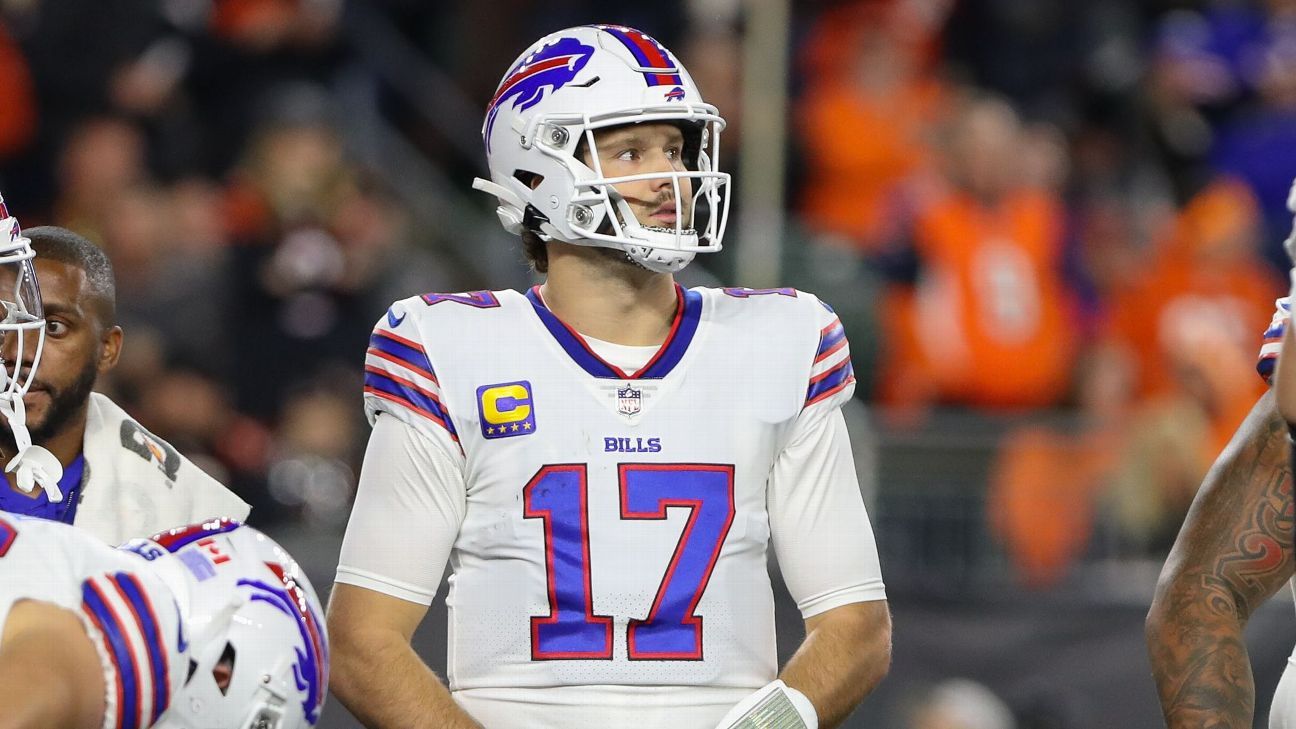BUFFALO, N.Y. — Answers on offense are in short supply for the Buffalo Bills, who scored 18 points in a loss to the Cincinnati Bengals on Sunday night.
After a loss to the New England Patriots in Week 7, coach Sean McDermott was asked why the team was having trouble scoring early in games.
“I wish I could tell you,” McDermott said. “… We talk about being more detailed, getting into a rhythm early, playing complementary football, and all three phases working together. … So just overall, got to find the answers to that.”
Fast-forward to Week 9 against the Bengals, the Bills offense came out with a statement touchdown drive, averaging 12.1 yards per play while playing up-tempo. But then Buffalo gained a total of 37 yards on the next four drives and took a 14-point deficit into halftime that proved insurmountable in the 24-18 loss.
The theme of the Bills offense has become too little, too late: They’ve averaged 6.8 points per game in the first half since Week 5 (ranked 28th) versus 13.4 ppg (third) in the second half during that stretch.
Questions on whether McDermott was considering making changes to offensive coordinator Ken Dorsey’s duties were met with a firm “no.”
The Bills’ chances of making the playoffs fell to 57.6% after the latest loss, according to ESPN Analytics. With eight games to go and facing the second-toughest remaining schedule, the Bills must find answers to problems they’ve been grappling with since the offseason: How to improve the running game, boost yards after the catch and limit mistakes like turnovers.
“The big thing for us is not becoming one-dimensional and predictable,” Dorsey said.
Statistically, the Bills offense behind quarterback Josh Allen looks good, ranked second in offensive EPA (65.12) and in the top five in a variety of categories, including yards per play and completion percentage.
But those numbers haven’t led to good performances regularly, especially early. The running game has been part of the issue. The Bills rank 26th in designed rush percentage (34.4%), and they haven’t consistently integrated second-year back James Cook into the offense. Cook had six carries for 20 yards against the Bengals and did not play a snap in the fourth quarter.
With 44 yards, Allen finished the game as the team’s leading rusher. This offense doesn’t need a dominant running game as long as Allen is putting up gaudy passing numbers. But they do need defenses to respect their running backs.
“I think that’s all part of being a good offense is being two-dimensional — not that you’re gonna be 50-50 totally balanced, but the threat of being two dimensional,” McDermott said after the game.
Integrating a running back who was also a threat as a receiver was part of the goal this offseason, in part because the Bills wanted to increase YAC. But the Bills currently rank 25th in YAC per reception (4.68).
Allen too often tries to make the big play downfield instead of taking the smaller gain. That was something he wanted to improve this year. He was more effective when he has less time to throw against the Bengals; he completed 81% of passes when he had less than 2.5 seconds to throw against the Bengals but completed 52.9% with 2.51 seconds or more to throw, per NFL Next Gen Stats.
Allen has seven touchdown on passes of 15 yards or more downfield, tied for third-most. But he has eight interceptions on passes if 15 yards or more downfield this season (the most in the NFL).
Since injuring his right shoulder against the New York Giants in Week 6, Allen has completed 3 of 15 passes with 20 or more air yards, including one interception.
“To be perfectly honest with you we felt pretty good about where his shoulder was going into [the Bengals] game,” Dorsey said.
Allen is tied for the league lead with nine interceptions and has the most interceptions in the league since he was drafted in 2018 (69). For its part, the offensive line is pass protecting well. Allen’s sack percentage is tied for the lowest of his career (3.9%) and the line’s pass block win rate is 64.2% (fifth-best).
One game and one adjustment won’t fix the Bills offense. Luckily for Buffalo, the next game is at home against the Denver Broncos on “Monday Night Football” (8:15 p.m. ET, NBC) against the league’s 32-ranked defense. After that, however, they face the New York Jets (4-4), Philadelphia Eagles (8-1), Kansas City Chiefs (7-2), Dallas Cowboys (5-3) and Los Angeles Chargers (4-4).
“For right now, we got to look ourselves in the mirror, understand we do have a tough stretch, but that’s the NFL,” center Mitch Morse said. “… We’ll look at the film and I mean, we’re not panicking, but the sense of urgency has never been higher.”







